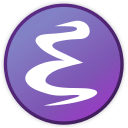Emacs runs on several operating systems regardless of the machine type. The main ones are: GNU, GNU/Linux, FreeBSD, NetBSD, OpenBSD, macOS, MS Windows and Solaris.
You can download GNU Emacs releases from a nearby GNU mirror; or if automatic redirection does not work see the list of GNU mirrors, or use the main GNU ftp server.
GNU Emacs source code and development is hosted on savannah.gnu.org.
GNU/Linux
Most GNU/Linux distributions provide GNU Emacs in their repositories, which is the recommended way to install Emacs unless you always want to use the latest release.
If your GNU/Linux distribution includes a graphical package manager, this is often the easiest way to install Emacs. Please refer to the documentation for your distribution for full instructions on how to install a package.
You might prefer installing from the command-line. Here
are some of the commands that various GNU/Linux
distributions use to install a package
named emacs.
guix package -i emacs
sudo apt-get install emacs
sudo pacman -S emacs
sudo dnf install emacs
sudo zypper install emacs
On some systems, the package name must include the Emacs
version number, such as emacs-27.1, instead
of emacs.
BSDs
The BSDs provide GNU Emacs in their repositories, which is the recommended way to install Emacs unless you always want to use the latest release.
Nonfree systems
The reason for GNU Emacs's existence is to provide a powerful editor for the GNU operating system. Versions of GNU, such as GNU/Linux, are the primary platforms for Emacs development.
However, GNU Emacs includes support for some other systems that volunteers choose to support.
The purpose of the GNU system is to give users the freedom that proprietary software takes away from its users. Proprietary operating systems (like other proprietary programs) are an injustice, and we aim for a world in which they do not exist.
To improve the use of proprietary systems is a misguided goal. Our aim, rather, is to eliminate them. We include support for some proprietary systems in GNU Emacs in the hope that running Emacs on them will give users a taste of freedom and thus lead them to free themselves.
Windows
GNU Emacs for Windows can be downloaded from a
nearby
GNU mirror; or the main
GNU FTP server.
Mostly simply, download and run the emacs-version-installer.exe
which will install Emacs and create shortcuts for you. Alternately, download
emacs-version.zip then unzip, preserving the directory structure.
You can then run bin\runemacs.exe or create a desktop shortcut to
bin\runemacs.exe and start Emacs by double-clicking on that
shortcut's icon.
The Windows binaries are signed by Corwin
Brust ECE7 7CF4 17C7 6C1A CFCE 7C2B 5B61 3551 1580 F007.
MSYS2 users can install Emacs (64bits build) with the following:
pacman -S mingw-w64-x86_64-emacsFor the 32bits build, run:
pacman -S mingw-w64-i686-emacs
macOS
Emacs can be installed on macOS using Homebrew.
brew install --cask emacs
Using MacPorts:
sudo port install emacs-app
The Emacs for OSX website also provides universal binaries.
